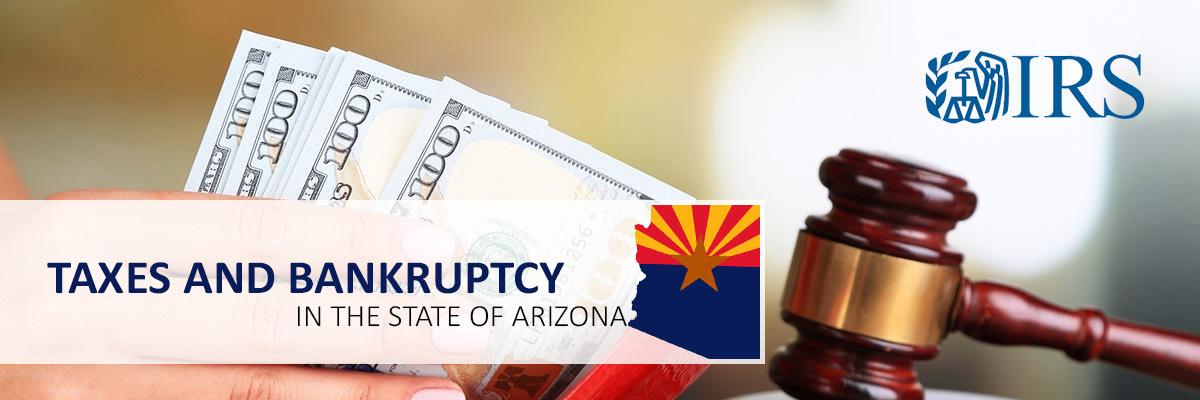TAXES AND BANKRUPTCY IN THE STATE OF ARIZONA
It’s the time of year when tax season is due. Many people are working the numbers and preparing tax returns. Anyone contemplating filing bankruptcy should know several points when it comes to filing and receiving tax returns and refunds.
Some people may be considering not filing a tax return for various reasons, but the IRS thinks you might want to reconsider not filing your tax return. On this IRS website, there are some good reasons to file your tax return:
It is important to consider both federal tax and the State of Arizona Tax in terms of the Arizona State Bankruptcy code, as well as convention when dealing with federal and state agencies, bankruptcy courts, and trustees. There are things you should consider if you have income tax debt, especially if it was incurred years before filing. It is equally important to deal with the issue now if you are unable to pay your tax, that you come up with a plan in bankruptcy court.
Tax issues for a chapter 7 Bankruptcy in Arizona
Chapter 7 paperwork must match your taxes
When filing chapter 7 bankruptcy in Arizona, a trustee will be reviewing your most recently filed tax return. You should be able to match up your income and expenses from your tax return to the same information in your bankruptcy paperwork.
Your tax return should also include the same number of dependents as your bankruptcy paperwork. If you are getting a refund, you should obtain those funds prior to filing bankruptcy. If you expect to receive the refunds after filing your case, the trustee will require turnover of those funds.
Discharge of Tax debts in chapter 7 bankruptcy.
There are several rules that must be met before the IRS will discharge your taxes. Initially, the debt must be more than 3 years old from when you filed the tax return to when you filed your bankruptcy. If you meet this qualification, the chances are good that the debt may be discharged.
Chapter 13 Arizona Bankruptcy Tax Information
Arizona Chapter 13 and tax Refunds
The bankruptcy trustee will require you to turn over tax refunds as a supplemental payment to your creditors in most chapter 13 bankruptcy cases in Arizona.
Keeping Tax Refund in a Chapter 13 in Maricopa County
In some circumstances, lower income earners may be allowed to keep all or part of tax refunds to help with basic living expenses. Chapter 13 bankruptcy plans may be from 36 to 60 months.
During the bankruptcy period, you will be required to furnish a copy of your tax returns to the trustee each year you are in bankruptcy. The trustee will review income to determine if any substantial increase in income may cause you to pay more into your plan. If your income has decreased, you may be able to petition the court to lower your plan payment.
Tax Debt During a Chapter 13
Be sure to file returns!
Tax debt in chapter 13 bankruptcy follows the same rules as in chapter 7. However, any recent tax debt that is deemed not dischargeable must be paid off in your chapter 13 plan. The IRS will submit a claim which itemizes which portion of the tax debt is dischargeable and which that is not.
If you have unfiled tax returns in chapter 13, your case may be dismissed without further notice by the trustee. Make sure you notify your attorney prior to filing your case if you have unfiled tax returns.
Tax Liens and Bankruptcy
If you have not paid your state or federal taxes, a tax lien will be placed on your property, such as your home. It can affect your ability to refinance or sell your home. In Arizona tax liens go through the county office and are not usually discharged in a bankruptcy, but like most things there are a few exceptions. This is where having an experienced bankruptcy attorney in Arizona that knows the laws regarding tax liens can be very beneficial.
Bankruptcy with tax obligations
Offer in Compromise
Tax debt can be challenging especially when dealing with the IRS or Arizona State Government. A bankruptcy may help you relieve some or all of that debt, or you may be able to pay it off over time through a chapter 13 payment plan. If you are thinking about filing bankruptcy and still have remaining tax obligations, it might be a good time to consider filing an Offer in Compromise to reduce your tax liability.
Seek Professional Help
If you have tax related questions with the IRS or the State of Arizona in regards to filing for bankruptcy, it is important to seek professional guidance and be up front and share all information regarding your debts. It may be that you can receive some relief or stay in your federal or state tax burden.
you can reach me at 623-777-4760 if you are facing debt and you are considering filing a bankruptcy



